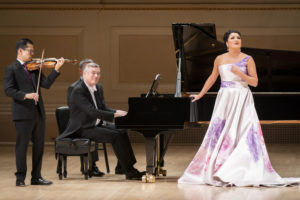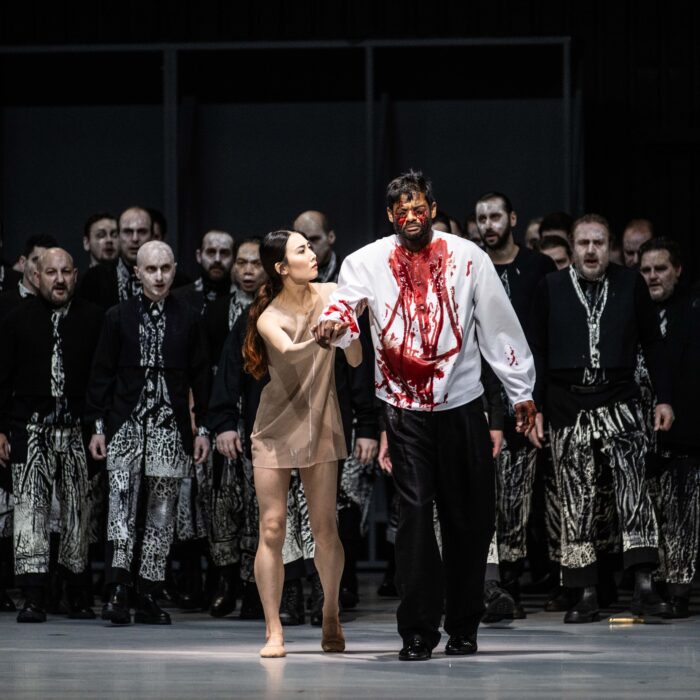
Carnegie Hall 2018-19 Review: Anna Netrebko In Recital
Anna Netrebko’s ‘Night & Day’ Is a Showcase Of Vibrant Musical Maturity
By Francisco SalazarThere were probably some skeptical people at Carnegie Hall on Sunday, Dec. 9, 2018. Anna Netrebko had previously canceled her recital debut at the hallowed hall on two previous occasions. Who said she wouldn’t do it again?
But the Russian diva, as she is wont to do, proved them and others else wrong, making the third time a charm and putting on a sensational recital that reminded everyone why she is so beloved.
Perhaps the most fascinating part of the recital is that it was not just a flashy exposé for her voice, but instead an introspective emotional journey, titled “Day and Night,” that served as a reminder of Netrebko’s exquisite musical intelligence.
Day
Dressed in a floral white gown, Netrebko arrived on stage with a bouquet of flowers, tenderly caressing them as she readied for her first set of pieces. She began with three Rachmaninoff songs. The first “Siren’” and the second “U moego okna,” Netrebko sang with a delicate lyrical tone that embodied the beauty of the two songs and displayed her ease with floating a line. Each one featured a gorgeous fil di voce at climactic moments.
The third piece “Zdes’ horosho” finally saw Netrebko open up and utilize her full tone. She began the line with an assured piano dynamic and crescendoed ever so slightly until she reached the climax, a high note that she held out for a few beats and glissandoed back down to the lower parts of her voice, allowing pianist Malcolm Martineau to end the piece with a brighter piano sound. At the end of the piece, Netrebko put down the bouquet of flowers on the stage and tenderly moved toward center stage.
Rimsky Korsakov’s “Zvonche Zhavoronka pen’ye” followed and Martineau began with a vigorous musical accompaniment that Netrebko followed. Smiling toward the audience, she sang with vibrant colors.
Strauss’ “Morgen” continued the program with Violinist David Chan in a duet with Netrebko. Chan began the piece with a warm timbre that gave the piece a serene start. Then when Netrebko entered,slowly caressing the phrases as she lovingly glance at Chan. As she began to sing her extended phrases, Netrebko also emphasized her German consonants, giving potency to each phrase. Together with Chan, their two instruments melded together to create a tenderness that makes his particular lied so memorable.
Debussy’s “Il Pleure
Then followed Charpentier’s “Depuis le Jour” from “Louise.” She began the
Then came two Tchaikovsky pieces “To bylo ranneyu vesnoy” and “Skazhi, o chom v teni vetvey.” The soprano scaled back her voice to give each piece a fine and elegant timbre.
Frank Bridge’s “Go Not, Happy Day” was a clear indication that the soprano was having a good time. She moved about the stage flirting and smiling at the audience. While her diction was a bit murky, her charisma made up for it.
The first half ended with Leoncavallo’s “Mattinata.” Netrebko picked up part of the bouquet and waltzed and twirled around the stage all while interacting with sections of the audience. At one point in the words “Ove
Night
For the second half, Netrebko walked on stage with a black velvet dress and a silver star balloon. She placed the balloon on stage left before indicating the night portion of her recital was about to begin. Then Jennifer Johnson Cano walked out on stage with a silver gown. Netrebko took her by the hand and the two walked alongside each other to begin “Uzh vecher” from “The Queen of Spades.” Johnson Cano began the duet with her dark mezzo before Netrebko joined her with a darker timbre than that the first half. Both voices meshed well as they walked the stage singing the gorgeous and nostalgic lines of the piece.
Rimsky-Korsakov’s “Redejet oblakov letuсhaja grijada” followed with Netrebko beginning the line with a darker shade. The ever-shifting accompaniment and lower voice of Netrebko made for a flow of emotions that eventually crescendoed to dramatic depths.
“Nochi bezumnye” by Tchaikovsky also showcased a more dramatic side to Netrebko. The frenzied line in the piano was well-balanced with the soprano’s more desperate and staccato phrasing, creating a moody atmosphere.
Three Strauss songs followed, “Die Nacht, “Wiegenlied” and “Standchen.” Each was sung with precision and elegance as Strauss calls for in his
With Faure’s “Apres un Rêve” Netrebko took advantage of the French line as her timbre flowed with ease. But she also gave it dark dramatic undertones, letting out her fuller soprano at the climactic moment. She held Martineau’s shoulder’s all while performing the piece.
In Dvorak’s “Songs
With Rachmanioff’s “Son,” Netrebko brought back that somber timbre that flowed through the depths of her lower voice middle voice showcasing the beauty and the dynamic range. In the piece’s second half, which emphasizes the wings of dreams, her voice soared, growing and growing with each passing phrase.
Douglas Moore’s “Gold is a fine thing” was the total opposite. Like the Frank Bridge, it was apparent that she was having a good time singing the lyric tessitura and emphasizing the flexibility of her voice. Netrebko accented the coloratura lines which easily glided as she ascended to the higher ranges and put out a potent high C-sharp that she easily held out at the close of the piece.
Then came the Barcarolle from “Les Contes d’Hoffmann.” As Martineau began to play the sensuous accompaniment, Netrebko took out a black silk fan and Johnson Cano walked out with elegance toward the piano. Netrebko placed the fan over the two to give a sense that they had kissed and then Johnson Cano began to sing with a seductive and rich tone that Netrebko matched. As they both looked one another throughout the duet, they phrased each line with lush colors and blended their voices to perfection.
The conclusion of the program was another duet of sorts. However, it was between Martineau and Netrebko in Tchaikovsky’s “Den’ li tsarit.” Martineau began the phrases with short, curt lines almost as if asking a question. But then the piano took off with arpeggios and with a more resolute tone. Netrebko joined in with an assured and bright sound, driving the piece with determination. Once she ended her line, Martineau continued that driving force, ending the recital official program on a high.
Encore
Two encores followed but unlike the majority of the recital where it was a duet between soprano and piano, this was all about the diva and she made sure that that was clear.
The first was Arditi’s ‘Il Bacio” which showed off Netrebko’s flexibility and the fact that she can still pull off an incredible coloratura line. Throughout the piece, she blew kisses to the audience and pranced around the stage.
Then to end she chose her signature “O Mio Babbino Caro” from Puccini’s “Gianni Schicchi.” Netrebko sang with a tender legato line and with sustained A Flats that led audiences to applaud in the middle of the
All in all, this was an evening of musical maturity and power. Netrebko and Martineau brought a well-balanced and sensitive program that was


